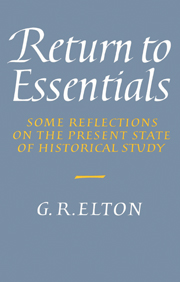1 - The Claims of Theory
Published online by Cambridge University Press: 05 June 2012
Summary
The main theme of these lectures will revolve around the current debates on the nature of history, debates that are especially active in the United States, but I must say at once that I cannot claim to offer an exhaustive discussion. I propose to home in on a selection of the arguments that are at present running around, and I apologize from the start to all the disputants whom I shall not be able to mention. I should also like to make it plain from the start that I shall be defending what may appear to be very old-fashioned convictions and practices. My views and attitudes were formed by some forty-five years of trying to understand the historical past and write about it, and in some people's eyes I shall unquestionably appear ossified, even dead. However, I can only preach what I believe, and I do believe in those entrenched positions concerning the reality of historical studies. Perhaps there is virtue in now and again tackling the champions of innovation and new fashion from a position of mere experience.
Where today shall we find the Queen of Sciences? In the middle ages there was never any doubt. Theology, the study of God's ways in his creation and outside it, took that place by natural right. It subsumed all sorts of studies that have since claimed autonomy: philosophy provided the means for discovering God's will; history followed God's path through past, present and future; the natural sciences expounded the details of a universe operating by the law of God; and so forth.
- Type
- Chapter
- Information
- Return to EssentialsSome Reflections on the Present State of Historical Study, pp. 3 - 26Publisher: Cambridge University PressPrint publication year: 1991



